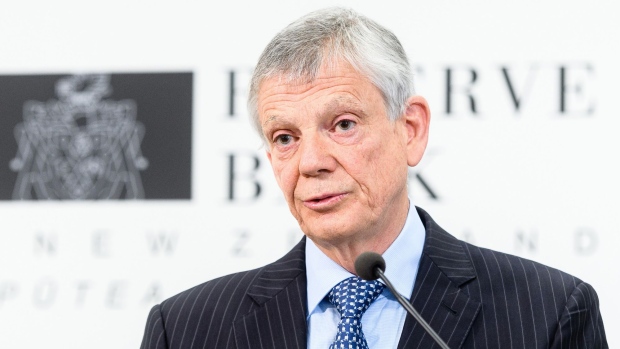Jul 25, 2022
Central Banks to Blame for Inflation, Former RBNZ Chief Says
, Bloomberg News

(Bloomberg) -- Central banks are responsible for soaring inflation rates around the world and should admit that they over-stimulated economies during the pandemic.
That’s the view of former New Zealand central bank governor Graeme Wheeler and Bryce Wilkinson, a senior research fellow with the New Zealand Initiative think tank, who have co-authored paper released Tuesday in Wellington titled: “How Central Bank Mistakes After 2019 Led to Inflation.”
“The main cause of inflationary pressures lies in the errors of judgment made by central banks in conducting monetary policy during the Covid pandemic,” they write. “While Russia’s invasion of Ukraine accentuated the rise in inflationary pressures, commodity prices were already high because of the rapid global expansion in liquidity and debt.”
Central banks “overdid interest-rate cuts and the scale of their quantitative easing,” and many continued asset purchases “when it was clear from the tightness of the labor market and rise in bond yields from late 2020 that their economies were stronger than forecast and that inflation pressures were starting to build,” Wheeler and Wilkinson say.
Wheeler led the Reserve Bank of New Zealand for five years until late 2017. During his tenure, the RBNZ raised rates in anticipation of faster inflation but had to reverse course when it didn’t materialize. Afterwards, Wheeler insisted the tightening was justified given the information he had at the time.
In a podcast released Tuesday with the paper, Wheeler is asked if he would have done anything differently and concedes the rate hikes were a mistake.
“We did have a situation that I do regret, we did get wrong, though at the time when we made that judgment it certainly wasn’t clear that we were doing anything wrong,” he says.
‘Glass House’
“I’m conscious that if you live in a glass house you shouldn’t throw stones,” Wheeler says. “But I’m very keen to collaborate with Bryce on this paper because the mistakes that have been made by central banks are so grievous, they’re so damaging in terms of the adjustments that lie ahead.”
In the paper, Wheeler and Wilkinson are critical of policy makers for failing to admit their errors and argue they need to fess up to their mistakes to rebuild credibility and restore public confidence.
“Central bankers need to reflect deeply on the management of monetary policy over the past two years and review their models and the assumptions and judgments they made,” they write. “Trite responses about ‘having no regrets’, ‘would not do anything differently’, and ‘there is no alternative’ are irresponsible and further damage a central bank’s credibility.”
Read More: RBNZ’s Orr Has ‘No Regrets’
Central bankers need to learn from their misjudgments because the social, economic, and political consequences of major mistakes run deep and the trust and confidence that the public have in them can be readily depleted, the authors say.
“Central banks could acknowledge what they believe they got wrong and what steps they are taking to rebuild public confidence,” they write.
While the paper is critical of central banks generally, it contains barbed comments about the RBNZ. In one section, Wheeler and Wilkinson say policy makers “took their eye off their core responsibilities and focused on issues that were much less central to their roles.”
“Confident in their ability to maintain low inflation, central banks in recent years began diverting resources to other topics such as climate change and inequality (and in the case of the RBNZ also embracing New Zealand’s indigenous history and culture and adopting a Māori world view in the operations of the central bank),” they write.
“Such issues bear little if any relationship to the reasons why central banks exist -- ensuring price stability and financial stability. Current monetary excesses and fiscal imbalances are undoubtedly much more pressing risks.”
Former Bank of Canada deputy governor William White has written a foreword to the paper in which he says the authors “make a convincing case that stimulative monetary policy during the global covid pandemic contributed materially to the inflation surge that followed and which persists today.”
White also says that Wheeler and Wilkinson are “surely right” in concluding that central banks could acknowledge what they believe they got wrong.
(Updates with Wheeler comments on own policy mistake in sixth paragraph)
©2022 Bloomberg L.P.






